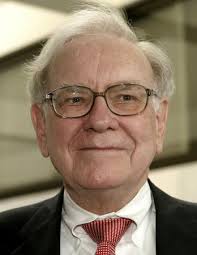I've long had an aversion to investing in technology companies because I really don't feel like I can value them accurately. I have no insight as to how likely it is that some other company will come a long with a better "mousetrap" and antiquate the technology of a company I'm looking at investing in.
If you are trying to practice value investing you obviously must first be able to value a company. To value a company you must be able to convince yourself with a reasonable degree of certainty the future cash flows that company is going to generate. For technology companies, given the rapid nature of change in the industry, having much if any certainty over those future cash flows is often impossible.
That aversion to technology has been a pretty standard theme in the value investing world. This aversion starts with the Master Value Investor Warren Buffett, who famously avoids exposure to tech companies.

So I was very surprised when I was perusing the most recent semi-annual report from legendary value investing firm Tweedy Browne to find the company writing about the virtues of Google (GOOG) as a value investment.
How can a value investing firm like Tweedy Browne own a technology company like Google? As indicated in the firm's shareholder letter, Tweedy admits that this is a bit of an unusual investment for it:
As we have mentioned in past letters, value investors such as ourselves often have a difficult time investing in high technology companies largely due to their frequent high valuations, rapid rates of change in technology, and the potential for obsolescence. The last thing in the world we want to do is pay a high price for a rapidly growing business that gets leapfrogged by technological change shortly after we buy it. With this in mind, you might be surprised to know that we began building a position in Google back in February of this year when the stock dipped down to around $565 per share. At this price, we felt we were getting a bargain, paying roughly 12.5 x 2012 estimated earnings net of the cash on its balance sheet. And this was for a business that grows its top line at greater than 20% per year.
Tweedy Browne isn't the only legendary value investor that I have seen extol the virtues of Google though. Ingrained in my memory is what Berkshire Hathaway's vice-chairman Charlie Munger said a couple of years ago about Google. In Munger's mind Google has the biggest "moat" protecting it from competition that he has ever seen.

By moat Munger is referring to how difficult it is for rivals to compete in the same business. The wider the moat, the more control a company has over its market and the more likely they are to be profitable. If you don't have any threat from a competitor, you can be much more aggressive with your pricing.
Tweedy Browne also recognizes Google's massive market share:
With market shares in the search business that range from 65% to 85% in most countries throughout the world, it is reasonable to conclude that Google has a strong competitive position. Google's revenue is roughly 15 times higher than its nearest competitor, which has enabled them to put significantly more money into R&D, distribution, and the development of products and eco-systems that further promote and protect the use of Google's search. Moreover, as Microsoft's investment in search can attest, the search business is expensive to enter.
Warren Buffett always talks about the moat that Coca-Cola (KO) has around its business. The brand is so strong that it is impossible for a new competitor to make inroads. Google is so popular that it is actually a verb. I don't ever go on my computer and use Yahoo to search for something. I always "Google" what I'm looking for. How does a competitor make an inroad against that?
But even with such a strong moat, valuation matters to Tweedy Browne:
We bought Google at roughly 12.5 x 2012 estimated earnings net of the cash on the balance sheet. We think this is a very low valuation as companies with market leading positions secured by strong competitive advantages in secular growth markets typically do not trade at market multiples. Unlike most companies growing revenue over 20% per annum, Google is also able to generate significant free cash flow due to the phenomenal economics of paid search. For these reasons we believe Google is undervalued and deserves a significantly above average multiple.
There are risks to every investment of course and for Google, Tweedy Brown thinks these risks include:
Vertical search, uncertainty regarding future growth rates, and risks related to Apple's strong share in smartphones and tablets all need to be monitored closely. Nevertheless, we feel that Google is well positioned to protect its interests and, perhaps most importantly, we paid a price that we felt more than discounted these potential risks.
At the end of the technology bubble, no value investor would have touched a tech company like Google. It wasn't because value investors didn't like the companies, it was because they didn't like the valuations.
Google’s share price has had a pretty good run in 2013 and is well above the $565 per share price at which Tweedy started buying shares, so investors may want to wait for a better entry price.

If you are trying to practice value investing you obviously must first be able to value a company. To value a company you must be able to convince yourself with a reasonable degree of certainty the future cash flows that company is going to generate. For technology companies, given the rapid nature of change in the industry, having much if any certainty over those future cash flows is often impossible.
That aversion to technology has been a pretty standard theme in the value investing world. This aversion starts with the Master Value Investor Warren Buffett, who famously avoids exposure to tech companies.
So I was very surprised when I was perusing the most recent semi-annual report from legendary value investing firm Tweedy Browne to find the company writing about the virtues of Google (GOOG) as a value investment.
How can a value investing firm like Tweedy Browne own a technology company like Google? As indicated in the firm's shareholder letter, Tweedy admits that this is a bit of an unusual investment for it:
As we have mentioned in past letters, value investors such as ourselves often have a difficult time investing in high technology companies largely due to their frequent high valuations, rapid rates of change in technology, and the potential for obsolescence. The last thing in the world we want to do is pay a high price for a rapidly growing business that gets leapfrogged by technological change shortly after we buy it. With this in mind, you might be surprised to know that we began building a position in Google back in February of this year when the stock dipped down to around $565 per share. At this price, we felt we were getting a bargain, paying roughly 12.5 x 2012 estimated earnings net of the cash on its balance sheet. And this was for a business that grows its top line at greater than 20% per year.
Tweedy Browne isn't the only legendary value investor that I have seen extol the virtues of Google though. Ingrained in my memory is what Berkshire Hathaway's vice-chairman Charlie Munger said a couple of years ago about Google. In Munger's mind Google has the biggest "moat" protecting it from competition that he has ever seen.
By moat Munger is referring to how difficult it is for rivals to compete in the same business. The wider the moat, the more control a company has over its market and the more likely they are to be profitable. If you don't have any threat from a competitor, you can be much more aggressive with your pricing.
Tweedy Browne also recognizes Google's massive market share:
With market shares in the search business that range from 65% to 85% in most countries throughout the world, it is reasonable to conclude that Google has a strong competitive position. Google's revenue is roughly 15 times higher than its nearest competitor, which has enabled them to put significantly more money into R&D, distribution, and the development of products and eco-systems that further promote and protect the use of Google's search. Moreover, as Microsoft's investment in search can attest, the search business is expensive to enter.
Warren Buffett always talks about the moat that Coca-Cola (KO) has around its business. The brand is so strong that it is impossible for a new competitor to make inroads. Google is so popular that it is actually a verb. I don't ever go on my computer and use Yahoo to search for something. I always "Google" what I'm looking for. How does a competitor make an inroad against that?
But even with such a strong moat, valuation matters to Tweedy Browne:
We bought Google at roughly 12.5 x 2012 estimated earnings net of the cash on the balance sheet. We think this is a very low valuation as companies with market leading positions secured by strong competitive advantages in secular growth markets typically do not trade at market multiples. Unlike most companies growing revenue over 20% per annum, Google is also able to generate significant free cash flow due to the phenomenal economics of paid search. For these reasons we believe Google is undervalued and deserves a significantly above average multiple.
There are risks to every investment of course and for Google, Tweedy Brown thinks these risks include:
Vertical search, uncertainty regarding future growth rates, and risks related to Apple's strong share in smartphones and tablets all need to be monitored closely. Nevertheless, we feel that Google is well positioned to protect its interests and, perhaps most importantly, we paid a price that we felt more than discounted these potential risks.
At the end of the technology bubble, no value investor would have touched a tech company like Google. It wasn't because value investors didn't like the companies, it was because they didn't like the valuations.
Google’s share price has had a pretty good run in 2013 and is well above the $565 per share price at which Tweedy started buying shares, so investors may want to wait for a better entry price.
